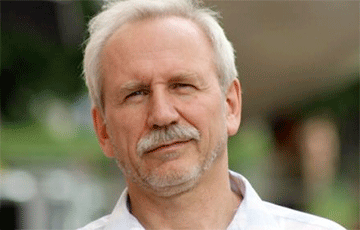Lukashenka’s Parting Words to Migrants
9- Valery Karbalevich
- 29.11.2021, 12:47
- 15,344

The border crisis is far from being resolved.
Germany did not accept Lukashenka's offer to shelter 2,000 migrants. The only result of the telephone conversations between Merkel and Lukashenka was the arrival in Minsk of officials from Brussels to discuss the technical aspects of the transit of refugees to their historical homeland. The EU is ready to allocate € 3.5 million for this. The first planes with refugees flew from Minsk to Iraq.
The most important thing that limits further blackmail through migrants is the cessation of their inflow to Belarus. As a result of the EU's work with governments and airlines in the Middle East, the flow of migrants to Belarus began to dry up.
Minsk understood this well and decided to play with the cards they have on hand. And these cards turned out to be those several thousand migrants who remained in Belarus and did not want to leave. There are about 2,000 Kurds on the border. And it seems that the Belarusian authorities have decided to capitalize politically as much as possible in this camp of migrants. As the hero of one television series said: "I don't have any trump cards, but I have something to go in with..."
On November 26, Lukashenka specially arrived at the transport and logistics center near the Bruzgi checkpoint, where the migrants were accommodated, in order to instruct them on the implementation of the purpose for which they are here. An impromptu meeting was called, at which he declared:
"If you want to go in the western direction, we will not choke you, grab and beat you. This is your will. If you can pass - go... I think we will solve your problem."
He gave an inspiring example that, every day, up to 200 people successfully cross the border.
Lukashenka noted that Belarus spent $ 12.6 million to support migrants and urged them to turn to the authorities for any help. (Why doesn't he pay such attention to the impoverished Belarusians or Belarusians in a difficult life situation?)
At the same time, he threatened his neighbors:
“If we do not solve the refugee problem in Belarus now, it will be much more powerful not only in spring but also in winter. We understand that a huge number of refugees will rush here, and it will be impossible to contain them at the border.”
That is, if the current confrontation on the border is resolved now, it can resume at any time. After all, its primary source, the primary cause, is the unresolved internal Belarusian political crisis. It has spilled out of the country, turned into a threat to regional security.
Moreover, the migration crisis is not only a regional problem but an international one. First of all, it affected the whole of Europe. An international conference on the future of Belarus was held in Vienna. In Berlin, the leaders of Germany and Poland, together with the NATO Secretary-General, discuss the crisis on the Belarusian-Polish border. By the way, NATO has suspended cooperation with Belarus. The leaders of Germany, France, Austria are constantly turning to Putin with a request to influence Lukashenka.
The states of the Middle East are involved in this migration crisis. Turkish and Syrian organizations that helped migrants to arrive in Belarus may fall under EU sanctions.
The transit between the West and the East is under threat. Let me remind you that Lukashenka promised to cut off Russian gas supplies to Europe. There were many kilometers of queues of trucks from the Belarusian side to enter Poland, Lithuania, Latvia. Companies of Russian carriers turned to the Russian government with a request to somehow influence the situation.
International organizations got involved in resolving the crisis. Lukashenka accused the UN and the Red Cross of supporting the protests. The International Federation of the Red Cross and Red Crescent has issued an emergency appeal, which says that the migration crisis on the border of Belarus with its neighbors has affected at least 20 thousand people.
Lukashenka always threatens with war if the world does not recognize him.
And this will continue until the internal political crisis in Belarus is resolved.
BBC interview
Aliaksandr Lukashenka’s interview with BBC TV caused a great stir. He willingly meets with journalists from the Western media, because he considers himself an outstanding polemicist, who knows how to outplay, out-argue, shut up any opponent. But his polemical abilities work under certain conditions. First, it should be a pure interview genre, when a journalist only asks questions, albeit sharp ones, but cannot enter into polemics in order to dispute something. This scheme allows Lukashenka to use any demagogic techniques without any restrictions.
Secondly, it works under the condition of the state's monopoly on the media. So that later no one can show that Lukashenka is telling a lie.
In this sense, Lukashenka's interview with the BBC was a clear example of what happens when these conditions do not exist. Journalist Steve Rosenberg showed an example of how you can resist the demagogic style of the interlocutor. He was well prepared, possessed of facts, and turned out to be no weaker polemicist than his opponent. Moreover, he did not need long monologs. With short but sharp questions and remarks, he knocked down all the polemical fervor of Lukashenka.
Lukashenka’s behavior was the main sign that the interview was not working out. It's hard to remember when he was so angry, aggressive, nervous. The standard prepared statements that he usually uses did not help. Lukashenka was so pissed off that he threatened to end the interview if the journalist behaved in this way. For some reason, he even answered an innocent question about Belarusian-Russian integration very aggressively. Because he could not return to normal. And this made a very bad impression on outside viewers, especially in the West.
Valery Karbalevich, Free News









